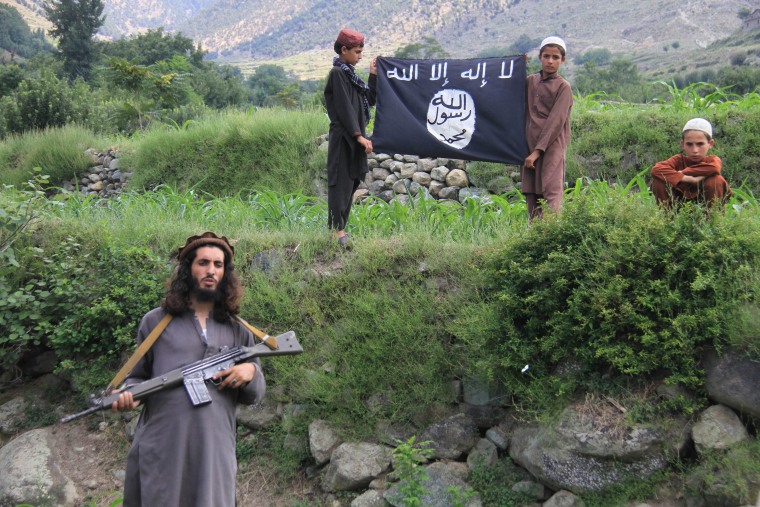KABUL, Afghanistan — ISIS is transmitting hours of extremist propaganda into homes deep in one of Afghanistan's biggest cities for the first time, according to officials and local residents.
The so-called "Voice of the Caliphate" has been carrying "lots of revolutionary propaganda and fatwas" calling for followers to kill anyone who stands in the way of ISIS since earlier this week, Achin district Governor Haji Ghalib told NBC News.
"If something is not done, it will have very serious consequences," he added.
Most Afghans do not have televisions and radio is the country's most powerful form of mass media. The Taliban, which has its own communications unit and often makes important announcement or threatens its rivals over the airwaves, has not yet managed to penetrate the country's urban centers.

News of the emerging radio station follows a Pentagon warning that the ISIS offshoot in Afghanistan has moved beyond the "initial exploratory phase ... and are becoming more operationally active.”
On Friday, Defense Secretary Ash Carter warned of the threat ISIS posed in Afghanistan.
"We are seeing little nests of [ISIS] spring up around the world, including here in Afghanistan ... but I will say that that is a threat that we track very closely," he said.
Related: Beheadings Raise Specter of ISIS on March in Afghanistan
ISIS, which has captured swaths of territory in Iraq and Syria, recently stepped up attacks on Afghan security forces in Nangarhar province, which is where Jalalabad is located.
ISIS-linked fighters have also lured members of the Taliban unhappy with the Afghan group's leadership, and the the groups have clashed.
That ISIS radio was being transmitted into Jalalabad terrified some who have fled fighting between the rival militant groups.
"We heard about [ISIS] radio a few days ago and for the past two nights I have been listening to it," Azizullah, who has been forced from his village and now lives in a camp for displaced people in Jalalabad. "It has become the talk of the camp. People are afraid, we have seen their brutality and know very well how serious this is."
"If the government does not stop this it will have a very bad effect on people's minds — there are a lot of youngsters who will be attracted to them," added Azizullah, who like many in Afghanistan goes by one name.
Afghan officials said the transmissions were coming from the Pakistani side of the border, a claim officials there rejected.
A senior commander for the Taliban, which has been battling the government in Kabul since it was toppled by U.S.-backed forces in 2001, confirmed that his fighters had also heard their rival's broadcasts. The commander also complained the Taliban did not have the money to compete with ISIS.
"We don't have enough resources as compared to our enemies, but even then we are successful in our job and people listen to us," said the commander, who spoke to NBC News on condition of anonymity. "We have installed transmitters in different places but we used to change the location of the transmitters and radio stations from time to time for security reasons.”
Related: Tens of Thousands Flee ISIS, Taliban, Violence
This latest sign that ISIS was gaining ground in the region comes almost a year after the group's media arm declared that Pakistan and neighboring Afghanistan were one region called the province of Khorasan — a name given to a historic region that covers part of modern-day Iran, Afghanistan and India.
While widely believed to count with relatively few followers, ISIS in Afghanistan and Pakistan has been moving into Taliban strongholds and clashing with its fighters in parts of the country, particularly in Nangarhar. On Dec. 7, the group took aim at the Taliban with a video saying the Afghan group's leadership had deviated from the righteous Muslim path.
The highly produced piece distributed by ISIS' official Telegram channel came five days after news emerged that the Taliban's recently installed leader Mullah Akhtar Mohammad Mansour had been badly wounded in a shootout with other militants. While the Taliban later issued an audio statement it claimed came from Mansour himself, rumors persist that he was killed and the movement's leadership is hiding his death.
Mushtaq Yusufzai reported from Peshawar, Pakistan. F. Brinley Bruton reported from London.

